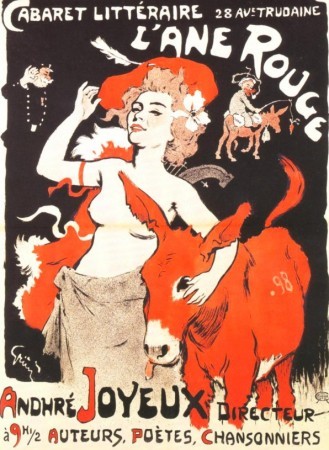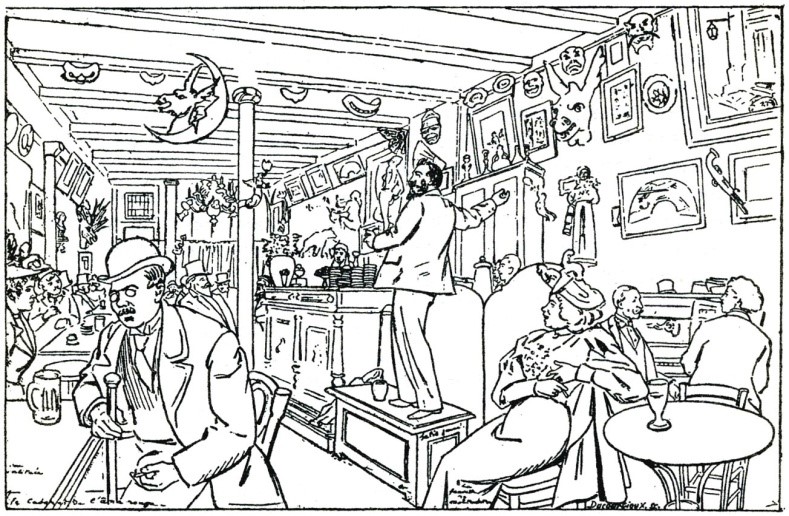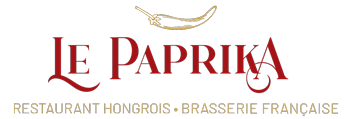A few words about us
The ultimate Hungarian restaurant in Paris is in Montmartre!
For a century, a donkey has been drinking pints by pouring paprika on his forehead to make it glow Paris poster

In 1871, following the bloody repression of the Paris Commune, a circular from the Ministry of the Interior invited the prefects to limit the number of cabarets. The students of the Latin Quarter are subject to incessant surveillance and the bistros are teeming with informers. This new singing bohemian is divided into picturesque small groups, such as the Hirsutes, the Fumistes or other Zutistes. The most famous of these cranks are the Hydropathes (literally “those who don’t like water”), led by a thundering liar with a thick beard, Émile Goudeau. It is a veritable literary and artistic avant-garde that was born around 1878 over colossal bacchanalian feasts. Soon, the Latin bistros refuse them entry and turn to the constabulary. Now, without drunkenness, there is no salvation. The verses are sad, the palettes are peeling and Verlaine is wasting away.
So it’s exodus. Tired of the Latin Quarter both for its prices and because of the taboos that curtail laughter, the more or less artistic youth launched an assault on virgin territories, to the north of the capital, beyond the opulence of Grands boulevards and even the famous Brasserie des Martyrs, at the bottom of the street.
This migration has remained famous for being at the origin of the mythical Montmartre… What is less known is that this Montmartre exile took place on the route of the Pigalle-Halle aux Vins omnibus, the “Pigallovin” as it is then nicknamed. The car is taken over by joyful bands which transform it, during the journey, into a whirlwind of songs and calls from angry passers-by. The scoundrels stop at the penultimate station. Not far from there, a microscopic bistro has conveniently opened in a former post office. The owner, a man named Laplace, has a brilliant idea: he wants to set up a themed cabaret, of the medieval genre, with shields on the walls, pewter mugs and costumes for the regulars, in order to satisfy his passion for François Villon. The odds and ends decor is provided by a concierge from rue Bochart de Saron who works at the Gobelins factory.
On the wall, paintings by André Gill. The sign bears the name “A la Grande Pinte”, but everyone says: “We are going to Laplace! “. The ancient Hydropaths indeed literally rush on the narrow gut that they invest in drunken conquistadors. There is Charles Cros the poet, Alphonse Allais and the very young Willette who scribbles Pierrots on the walls. But above all, it was here that Goudeau met a former Massier from the Beaux-Arts, Rodolphe Salis. The latter looks around him, assesses the collective joy and prodigality of old Laplace who gives credit to the whole merry troop. “Bankruptcy within the year,” he prophesied. But he also understands the revolutionary character of the themed cabaret. A few months later, he opened the first Chat Noir next door, at 84 bd Rochechouart. A little later, Willette and Goudeau broke with Salis to return to Avenue de Trudaine to found “L’Âne rouge”, a competing cabaret
run by Salis Gabriel’s own brother. The “red donkey” is the nickname given by his enemies to Rodolphe Salis to point out his bad temper. La Grande Pinte, anerougized then magyarized today under the brand of Paprika, can therefore rightly pride itself on being the Bethlehem of the Montmartre legend.
Text by Bihl Laurent, friend & enlightened amateur


